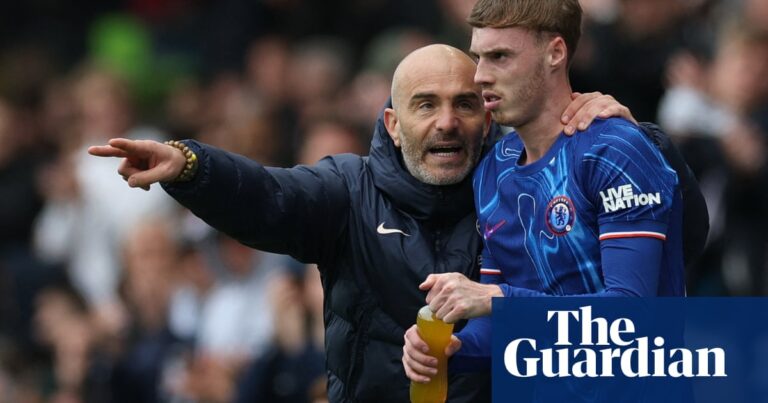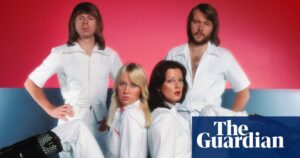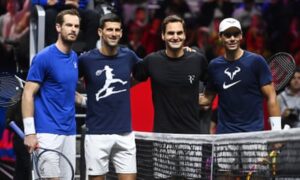“Before it was Ronaldinho and now it’s people like … well, me,” Marc Cucurella says, and then there is laughter. With him there is a lot of laughter. All of a sudden the Chelsea defender is a European champion and cult hero, and you can see why. There’s the hair: massive, as the song says, and in the right light still a bit red, celebratory dye not entirely washed out three months after Spain won Euro 2024. There’s the playing style that helped take them there, “one people empathise with”. And there’s the personality. What was it Erling Haaland said? “He’s a funny man.”
A very funny man.
“So they say,” Cucurella replies, spontaneity and speed in his speech, enthusiasm in every word. “A bit, maybe. What I am is a fun bloke. It’s not that I am cracking jokes all the time but there is a happiness. Being with me is all right, you know? You have a good time. For me to have become people’s idol, in speech marks, is nice. Maybe in the past people only liked forwards, players who dribbled or scored goals. If they’re buying my shirt or doing banners for me, then maybe football is changing. Something is.”
It happened fast. There is an ease about the 26-year-old – being with him is all right – but it is, he admits, something he worked at. He has learned to relativise, to let go. He has learned about himself. He has had to because, for all the laughs, it hasn’t been easy. Signed by Chelsea for £62m, for some a symbol of the madness at Stamford Bridge and maybe even cheap now, he was whistled by their fans not so long ago. It was not him ending the Euros holding the trophy that was unexpected, it was him being there at all. He is now among the players whom supporters most want to see at Spain’s homecoming in Murcia on Saturday.
Could he have imagined this even six months ago? “Of course not.”
Cucurella was not in Spain’s squad for the friendlies against Colombia and Brazil when it was named in March and no one expected him to be. He had played for his country only once – and that was three years earlier in a match that will make a good pub quiz question one day, one of 16 players making a debut as the Under-21s fulfilled a pre-Euros senior fixture during the pandemic.
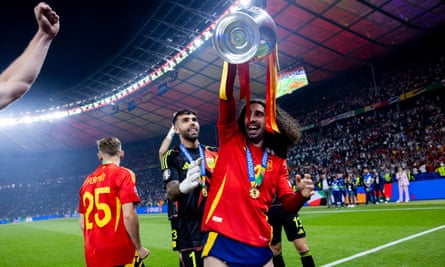
He had also made one Chelsea appearance in three months. And although he got a call from Luis de la Fuente after Chelsea’s FA Cup quarter-final win over Leicester because of an injury to José Luis Gayà, even then most expected it to be a one-off – Cucurella included.
“He asked how I was, said Gayà was out and could I come. I said: ‘Of course, I’d be delighted.’ That call was like a reward, a reason to keep going; it gave me energy. I came to enjoy it, to have a good time, after everything I had been through.
“When I went to Chelsea it all happened to me. We were in a hotel a long time, things weren’t going so well at the kids’ school, we got burgled … It was Brazil-Serbia, during the World Cup. My wife went into the bedroom and found them. It wasn’t nice; we went back to a hotel because we were scared. Then I was in hospital for three days [with a virus]. I wanted to play anyway but I wasn’t in good shape. It’s experience too: until it happens to you, you don’t know how you’ll react. Now it wouldn’t [affect me] in the same way.
“I had been at humbler teams before Chelsea and I got there at a time of change, a difficult time, with lots of players, lots of coaches. It was [like it was] all my fault; they kept coming for me. People see the price and think you’re a machine that’s going to score 50 goals and provide 50 assists. That’s business between clubs: they agree [the fee], nothing to do with me.
“I’ve had more coaches at Chelsea than in my career. [Thomas] Tuchel, [Graham] Potter, [Frank] Lampard, [Mauricio] Pochettino, now Enzo [Maresca]. And Bruno for a game. I wasn’t with Tuchel for long; we could hardly get to know each other. Then Graham Potter came, who I’d been with at Brighton, but it was hard. He had a lot of players, he didn’t quite find the style. And with Lampard too … well, lots of things.”
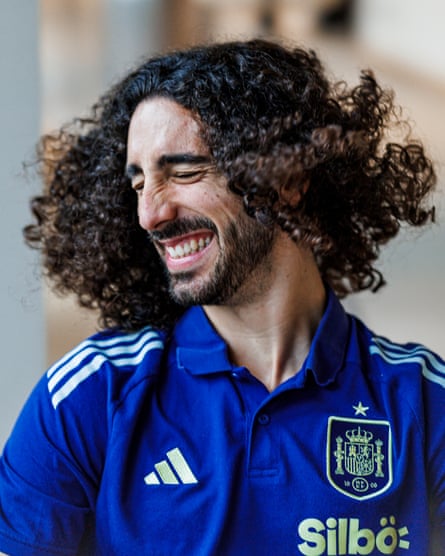
Then came the ankle injury. “If I had to name a moment that changed my career – and it’s weird because it’s an injury and no one wants to be injured – it’s the ankle injury last season,” Cucurella says. “You’re on your own, there’s a lot of time to think, to work. And those two months helped me mentally. There’s a before and after. I saw a mental coach and that helped.
“The criticism is hard, you take it personally. Once the game is over, it’s over. You can be annoyed one day or two or three, but it makes no difference. That used to happen to me. It gets in your head more and you lose confidence. And once you lose that confidence, you’re not the same. It’s like you’re scared, things don’t come off, there’s a darkness, a confusion. But I’ve reached a point where it doesn’t matter. It’s not easy to get there; I’ve worked at it. That period injured helped me to know myself better. One day you’re up here, the next you’re injured and no one knows you. That helped me to see. It all depends on you.”
Not everyone had forgotten: De la Fuente’s call offered a new start. Cucurella played well against Brazil and would become a regular back at Chelsea, supporters won over by a shift in position. Then when Spain’s squad for the Euros was named he was included, with Gayà and Alejandro Balde injured. Still, most expected him to be a substitute behind Álex Grimaldo; even Cucurella says he thought their different profiles might have meant sharing duties depending on the opponents.
Instead, he was a regular and a revelation. A defender whose on-field persona is, he says, the polar opposite of what he’s like, all “bad milk” and attitude, he provided the assist in the final. He also made the “save” in the quarter-final, a decision Uefa said should have been a penalty. Three months later.
after newsletter promotion
He is laughing again. “It hit my hand very clearly but I looked at the ref and, very sure of himself, he said: ‘No, no.’ I think: ‘Relax.’ Phew. They can’t come out one month and say it’s handball, then a month later say it’s not. They’re the ones creating controversy. It’s a bit weird, but there’s nothing we can do now.”
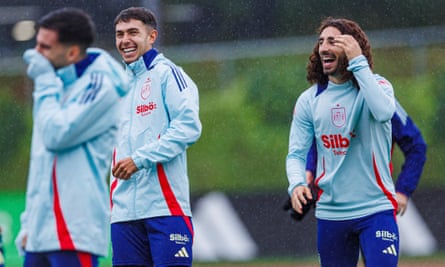
Now he is a European champion, life turned upside down. Or the right way up. “Before, people liked the superstars, now they empathise with me. For people to support you, admire you, is very nice. It’s true that before I could go to the supermarket or whatever and now …” he says, cracking up again. “Well, I still go because I don’t think, but sometimes it’s a bit of a mess.”
There were banners – “If we have a boy we’ll call it Marc; if we have a girl, Cucurella” – and wigs and endless memes, his hair a dog barking at German players. There were the cheeky retorts too: Gary Neville had said he was one of the reasons Spain couldn’t win the Euros, so Cucurella sent his thanks for the support. There was the dyed hair. “I’ll do something simpler next time,” he says. There was that chant, embraced and repeated, embellished too; it is, he says, inescapable, sung at him everywhere he goes. And an advert for Estrella, of course.
First a confession: paella isn’t his favourite dish, he admits. When one video of him emerged, a little the worse for wear, singing a version of the song that had Cucu-Cucurella drinking Estrella, eating paella and making Haaland tremble – “give him a biscuit” – it didn’t go unnoticed. The Norwegian’s inclusion was a compliment, a name to represent the most fearful of opponents, but he seemed to take it personally until Cole Palmer told him Cucurella was a good guy really. The next time they faced each other, Haaland pushed him over, scored and called him a funny man. “Last season he asked for my shirt and this summer he sings a song about me,” the City striker said.
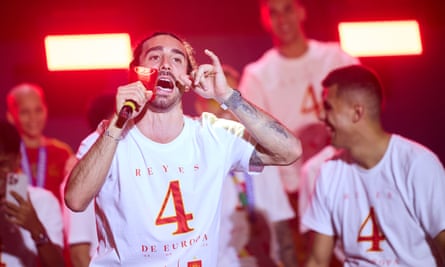
“That was the first game of the season too!” Cucurella says, laughing. “It was like the Premier League did it deliberately. It was fun. That’s football. In the end it’s a laugh. That’s how we have to approach life.” Do we take football too seriously? “A bit, yeah. Look, I know it’s something people are invested in. But in the end, it’s a sport.”
Chelsea lost that day, but are unbeaten in six league games since. Life has changed and so have Chelsea, even if Cucurella jokes that he seems to be in trouble every week and the yellow card count is suspiciously high. Maresca described him as a player who makes teammates better, and that is a description that he identifies with: not top in anything, perhaps, but all about the team. A tactical change at the end of last season helped too, with Cucurella’s shift to an inverted full-back key to their late revival.
“It was cool,” he says. “Pochettino put me there at Aston Villa. We were losing 2-0, we had been a disaster and he changed the structure. We finished 2-2, we had a goal ruled out and we won the next five. And Enzo has that same idea a bit. We’ve come off two years and I think the owners now understand how everything works. Enzo is a very good coach, he knows a lot and I think if they listen to him and take on what he says, he can bring Chelsea back to a good place.”
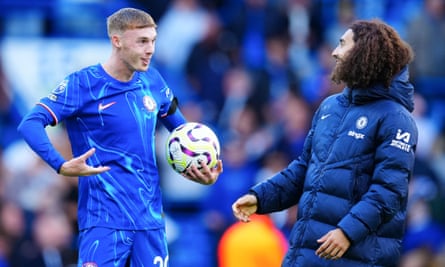
If one Chelsea player stands out, it’s Palmer. “If you see him not in his kit you would never in your life say he was a footballer, but then on the pitch … he shoots and it doesn’t seem like he is hitting it hard but he scores them all. He’s very different. I don’t know how to explain it: he’s special. We’re very lucky we have him. We’re lucky he didn’t play much in the Euros either because he came on and almost messed it up for us [scoring in the final]. If he carries on like this, he’ll be among the best. There’s not much strength in the hair, but if that’s his only problem, then he’s all right.”
Cucurella’s ambitions for the season at Chelsea are clear. “Our objective has to be to win a trophy. In the Conference League we can do something good. And the cups. Last season we reached a final and a semi-final. In the league we have to be in the top four. Arsenal and [Manchester] City have been working in the same way for many years, the same idea, the same players, and I think we’re a bit far away from that. Liverpool too because it’s been the same players. But we can get into Champions League, that’s the key objective. I’m very happy.”
Source: theguardian.com










